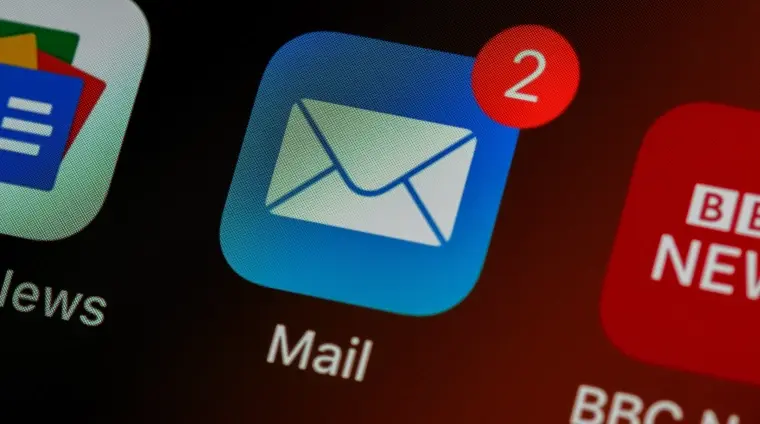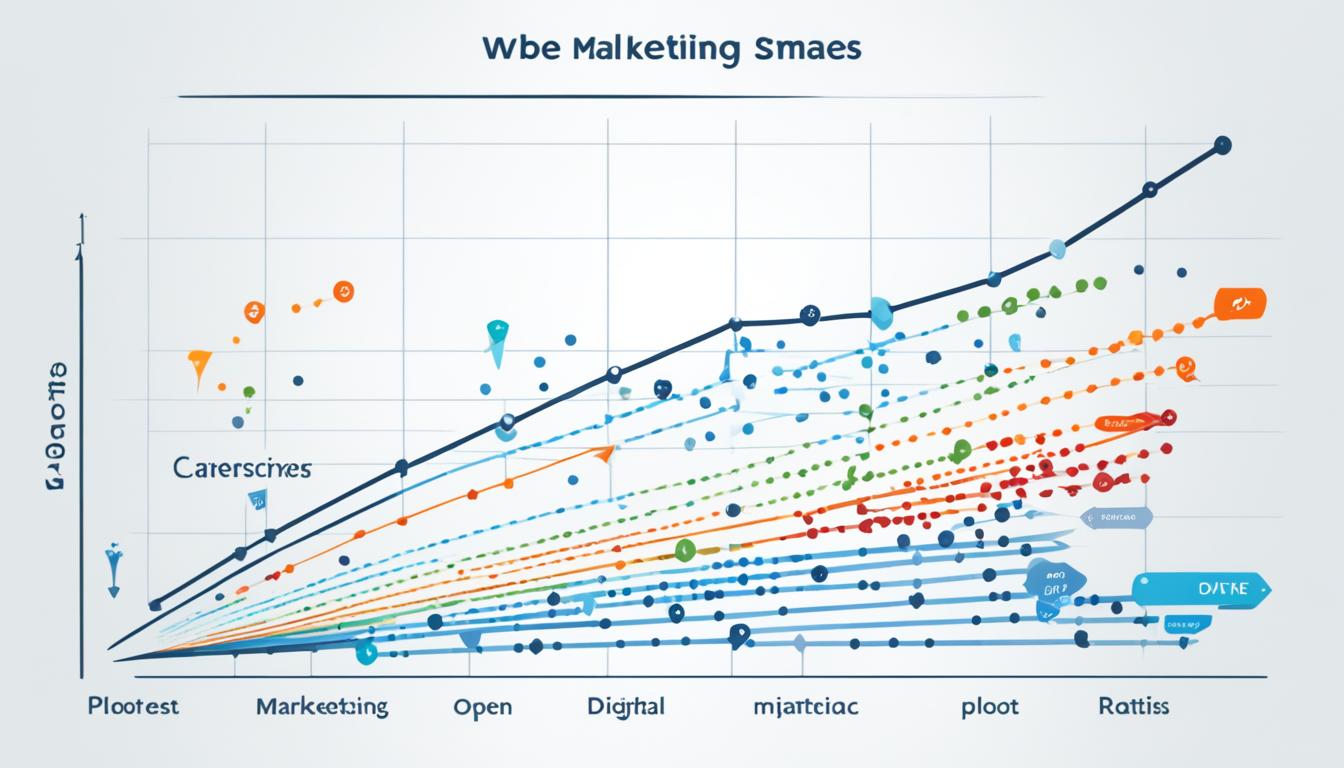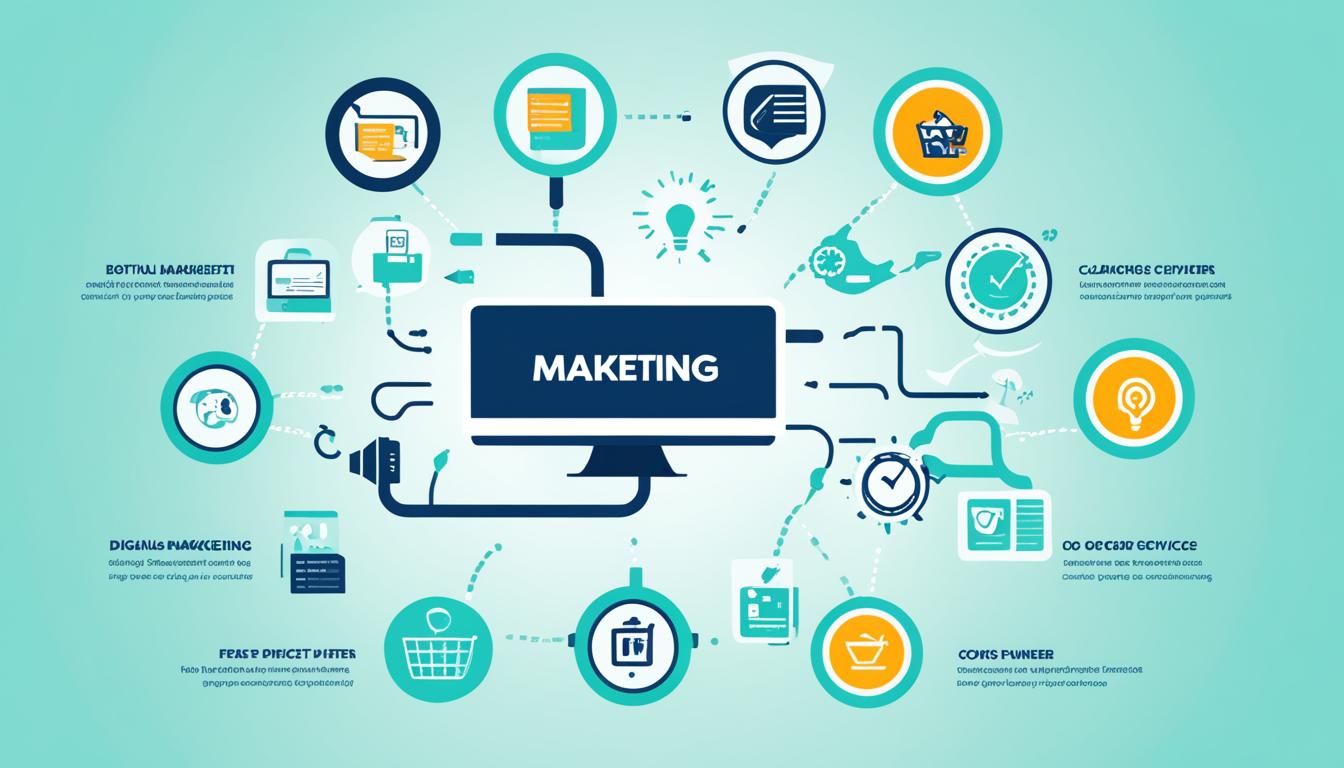Did you know that a big 71% of Hiring Managers struggle to find digital marketing experts for their jobs? It’s a huge opportunity for those wanting to get into the field. This guide is here to help you succeed, whether you sell online or locally. Digital marketing can seem complicated, but the key is starting with the basics. Then, you can use advanced tools and techniques to grow your business. Everyone starts at the beginning, and here’s your guide to start your journey in digital marketing.
Key Takeaways
- Identify your strengths and focus on areas like analytics, ad optimization, or content creation to start your digital marketing journey.
- Get hands-on experience through freelancing or internships to build a strong portfolio.
- Continuously learn and stay up-to-date with the latest digital marketing trends and best practices.
- Leverage a variety of digital marketing tools to enhance your skills and campaign performance.
- Network with industry professionals, both online and at in-person events, to grow your connections and potential job opportunities.
Introduction
Digital marketing means showing a company’s products or services on the web. It includes ads on apps, sites, social media, and search engines. This way of marketing aims to meet customers on their devices. It changes often because more than billions use the internet, moving ads from papers to the web.
The Importance of Digital Marketing
Digital marketing is really important today. Since most people use the web, companies need new ways to catch their eye. By using online tools, they can see what works, make things more personal, and connect worldwide. This is key for digital marketing’s success.
The Challenges of Starting Out
Starting in digital marketing can seem hard, but it’s full of chances. Yet, learning social media, tracking on Google, and sending emails all together is a big job. The trick is to do what you’re good at and like. Then, grow your skills little by little to succeed here.
What is Digital Marketing?
Digital marketing combines art and science to boost your brand’s engagement and sales online. It includes strategies like creating websites, email lists, and search engine optimization. It also features social media outreach, such as on Facebook, LinkedIn, and Instagram, to connect with new customers.
Definition and Scope
Digital marketing uses online channels to promote products and brands. It includes search engine optimization (SEO) and search engine marketing (SEM). It also involves content marketing, social media, and email efforts. The aim is to use these tools to reach consumers and increase sales.
Key Components of Digital Marketing
Digital marketing involves many evolving techniques. Key components include:
- Website Development: Creating and updating an attractive website is crucial.
- Search Engine Optimization (SEO): It’s about improving your site’s content for better search rankings.
- Social Media Marketing: Engaging with your audience on platforms like Facebook and Twitter.
- Content Marketing: Sharing valuable content to attract and keep an interested audience.
- Email Marketing: It focuses on collecting contacts and sending them personalized offers.
- Paid Advertising: You can use ads on Google and Facebook to target specific groups.
These are just some parts of digital marketing, which is always changing. As technology and buying habits evolve, those in digital marketing must also adapt. This helps them keep reaching and engaging the right people.
Essential Skills for Digital Marketers
Digital marketing is a mix of marketing and tech. It connects marketers with tech experts who make tools. These tools help streamline the customer’s buying process. The six main types of digital marketing are: 1) Content Marketing – It’s essential for websites to have useful, updated, and engaging content. Search engines love this. 2) SEO – It’s about how to make your website rank higher in search engine results. 3) SMM – This includes using social media to promote products naturally or through ads. 4) SEM – It involves paid ads on search engines like Google. 5) Paid Ads – This means advertising using attractive visuals and strong messages. 6) Email Marketing – It focuses on creating quality leads and sending people relevant content by email.
Content Creation
Creating content is very important. It helps solve problems and meet the needs of potential customers as they move through the buying process. Content marketing is vital in digital marketing. It includes finding important keywords, writing blogs, and improving how products or services are described. It also means creating educational content to attract and keep your audience interested.
Search Engine Optimization (SEO)
Knowing how to use SEO is key for a digital marketing expert. It involves using good practices to get noticed by search engines. These practices also attract more people to your website.
Social Media Marketing
Social media marketing is a big deal because so many people use it. Digital marketers need to be good at both creating interesting content and running effective ads on these platforms. This is essential for winning over your target audience.
Email Marketing
Email marketing is still a top way to reach customers. It’s important for marketing professionals to know how to use email newsletters to share content. Most digital marketers say email has become more engaging over the past year. This proves the power of email marketing when it’s done right.
Data Analysis
Being good at research and collecting data is a must for creating content that really speaks to your audience. Digital marketers need to know how to use tools like Google Analytics and Google Ads. These tools help them understand what the data means. They use this knowledge to make smart choices in their marketing work.
Content Marketing
Content marketing is key in the digital world. More than 75% of all digital marketers rate an SEO content marketing method highly. Agencies have seen a 62% growth in clients who want content marketing help. Today, 70% of marketers put their efforts and funds into content marketing.
Importance of Content
Search engines really like certain types of content. They like it to be engaging, only full of useful stuff for searchers, regularly updated, and unique. A good blog marketing plan could up your chances to rank high in searches by 434%. This is extra important since nearly all searchers don’t look past the first page of Google results.
Types of Content
There are many types of content for a marketing plan. You can use blog posts, videos, webinars, and much more. A survey showed that 44% of people look at three to five pieces of content before reaching out to a business. Also, 69% like to watch short videos to learn about products or services.
Content Creation Strategies
Creative content that people enjoy and includes the right keywords is good for SEO. Add internal and external links to give your content more value. Content marketing is cheaper than outbound marketing by 62% but brings in more than three times the leads.
Email marketing, social media, and content marketing are the top ways to keep customers. This shows that having a solid content plan is crucial for success.
Search Engine Optimization (SEO)
SEO is vital for any digital marketing plan. It helps your website show up more in search results. There are two main kinds: On-page SEO improves your site directly. Off-page SEO works on improving its reputation around the web.
On-Page SEO
With on-page SEO, you boost your site’s content and structure. This makes it easier for search engines to find and understand. You do this by adding certain details to your pages, like title tags and meta descriptions. Also, your content should be interesting, well-organized, and updated regularly.
Off-Page SEO
Off-page SEO is about actions done outside your website. Its goal is to boost your site’s credibility on the web. You can do this by getting other reputable sites to link to yours. Also, sharing your site’s content on social media can help spread your brand online.
Keyword Research
Keyword research finds the best words or phrases to target. By picking the right keywords, you can attract more of the right visitors to your website. This research helps you make your site more visible in search results. It also guides your content creation strategy.
Social Media Marketing
Social media marketing is key in any digital strategy. It comes in two main forms: paid and organic. Paid marketing includes ads and ways to bring new fans. Organic, however, is the more mysterious of the two but can be more exciting.
Choosing the Right Platforms
Picking the best social media platforms for your business is crucial. You should connect with your audience and customers where they already are. Knowing things like who uses the platforms most and what content they like can help. For instance, Instagram is great for targeting Millennials.
Organic Social Media Strategies
In organic strategies, the main goal is to provide value and engage your audience. This involves sharing educational content, giving sneak peeks, and encouraging user posts. While it may take time to see results, it’s great for spreading brand awareness and gaining loyal followers.
Paid Social Media Advertising
Paid advertising in social media is also crucial. Using the targeting and measuring tools on platforms like Facebook can really help. This method can get you in front of new eyes, drive traffic to your site, and increase sales. Paid and organic strategies together make a big difference in your success.
Email Marketing
Email marketing is alive and kicking. It’s a top choice for reaching out. The main goal is generating leads from your online activities. Next, hit them with personalized, engaging content in your emails. Doing this makes your email lists super valuable. Make sure what you send is top-notch. Email marketing covers a lot, from thanking new buyers to sharing awesome new things. And cool tools can tell you what’s working in your emails.
Building an Email List
Having a big email list is key. Use your website, social spots, and talks in person to get folks to sign up. Offer them something good in return, like special info, deals, or free stuff. Organize your list based on what people like, do, and who they are. Then, give them emails that they just can’t ignore.
Email Marketing Campaigns
To really move your peeps with your email campaigns, you need a plan. Use tested email setups, catch their eye with great subject lines, and make it personal. Mix up your content like a pro, with news, fun stuff, and sales. Keep an eye on what’s working and tweak your strategy. This will keep your emails popping.
Email Automation
Email automation makes your life easier. It lets you run your email marketing smoother and smarter. Do clever things like welcome new sign-ups, nudge folks about items left in their cart, or send tailored messages. These tools are your backstage secret. They save you effort, smooth out how your peeps see your brand, and kick your email marketing up a notch.
Starting Out
If you’re new to digital marketing, it’s okay to start small. Begin by knowing what you’re good at. For those who like working with numbers, try diving into data and ad analytics. On the other hand, if creativity is more your thing, consider content making.
After choosing your focus, start getting real-world experience. Look for freelance projects or part-time gigs. You can even offer your help to local companies for some practice.
It’s also important to keep learning. Whether through classes or self-study, aim to grow your skills continually. Keeping up with the newest trends and tools is a must. This dedication to learning will help you go far in your digital marketing journey.
Digital Marketing Tools
Digital Marketing becomes easier with more tools at your fingertips. Analytics tools like Google Analytics and Google Ads measure campaign success. SEO tools such as Ahrefs, Moz, and SEMrush help Marketers with keywords, backlinks, and SEO insights.
Email tools like MailChimp and SendGrid are great for campaigns. Knowing CRM software like Salesforce or Hubspot is also useful. For social media, Hootsuite, Later, and Buffer help in managing content. These social media tools can boost your marketing efforts.
| Tool | Pricing | Key Features |
|---|---|---|
| Hootsuite | $99/month for up to 10 profiles | Social media management, analytics, content scheduling |
| Later | $25/month for 1 social profile | Instagram planning and scheduling, analytics |
| Buffer | $6 per profile/month for individuals, $12 per profile/month for teams | Social media scheduling, analytics, team collaboration |
| Sprout Social | $199 per user per month for up to 5 profiles | Social media management, analytics, customer engagement |
| Loomly | $42/month for up to 10 social profiles | Social media planning, scheduling, collaboration, analytics |
| Sprinklr | $299/month per user for 7 social profiles | Unified customer experience management, analytics, AI-powered insights |
Besides social media tools, Digital Marketers can use email marketing tools. MailChimp and SendGrid help with custom emails. They also let you target specific audiences and track your email success.
For SEO tools, Ahrefs, Moz, and SEMrush are key. They offer insights for improving your site’s search visibility. Using these digital marketing tools boosts your marketing work.
Building a Digital Marketing Portfolio
Creating a digital marketing portfolio is tough. Digital Marketers must show more than just the final product. You have to show how you worked with others, planned, and thought strategically. Be sure to point out your part in any published work, like newsletters or social media posts. Showing teamwork is key. It’s better to share achievements than show off alone.
Showcasing Your Work
Quality is more important than quantity in showcasing your work. Choose projects that really show what you can do. Explain the thinking and steps behind each project. Add numbers to show its success. This helps people understand and value your work.
Demonstrating Strategy and Planning
Showing your strategic thinking and planning is vital. Talk about how you start and complete projects, and the results you get. It’s important to show you can work with others, lead, and change plans when needed.
Including Data and Metrics
Don’t leave out data and metrics. Be proud to share important numbers and results that show your work’s success. This not only shows you’re good with numbers but proves you’re a great marketer.
| Metric | Percentage |
|---|---|
| Portfolios with an ‘About You’ section | 75% |
| Portfolios showcasing professional experience | 60% |
| Portfolios including contact details | 90% |
| Portfolios highlighting successful work examples | 70% |
| Successful portfolios featuring testimonials | 50% |
Developing a Digital Marketing Resume
Your resume is often the first thing a future boss sees. It’s key to make a great first impression. Experts say you have about six seconds to impress. So, make sure your resume is clear and well-organized. Use bullet points to list your marketing skills and experience. Hard numbers make a big difference. But remember, save the detailed stuff for your portfolio.
Highlighting Your Skills
Customize your resume for each job by using the company’s language. Put your marketing skills at the top, focusing on ones that match the job. Then, share your transferable and problem-solving abilities. Be sure to show your personality and creativity. Just make sure it fits the company’s style.
Tailoring Your Resume
It’s crucial to tailor your resume to fit each job posting. Start your points with strong action verbs like “expanded” or “launched”. This makes your achievements stand out. Add numbers to show results. Following a format of action verb + task + result helps show off your successes.
Showcasing Your Personality
For a great digital marketing resume, highlight your expertise in areas like content marketing, lead nurturing, email marketing, SEO, social media advertising, UX design, data analysis, and more. Make sure to mention your skills with digital tools. This could include Google Analytics, SEO tools, and social media. Do away with extra sections that don’t add to your unique skills.
Networking in Digital Marketing
Building a wide network in digital marketing starts with a strong online presence. Keep your social media accounts like LinkedIn and Twitter active. You can also launch a blog or newsletter. This lets you share your knowledge and connect with others in the field. These efforts help you show what you know, make friends, and keep up with changes.
Attending industry events is also critical for growing your network. From small meetups to big conferences, these events let you meet others. You learn from experts, brainstorm with peers, and find new tools to use. For example, the Digital Marketing Conference in Toronto offers many networking opportunities. Meanwhile, sites like MarketingTerms show lots of online events for different parts of the industry.
In the end, connecting with others drives your career in digital marketing. Through both online and face-to-face chats, you get new ideas and chances to work together. Showing your real self, offering help, and keeping relationships up can open many doors for you in digital marketing.
| Statistic | Value |
|---|---|
| Professionals who emphasize the importance of personalizing outreach | 72% |
| Professionals who recommend continuous nurturing of relationships | 88% |
| Sources noting the necessity of expanding networks to facilitate growth | 93% |
| Professionals who stress the long-term nature of networking investments | 78% |
| Digital marketers who believe networking is crucial for their success | 85% |
| Digital marketers who say networking has helped them stay informed about industry trends | 72% |
| Digital marketers who have found networking to be a valuable source of career growth opportunities | 68% |
| Digital marketers who leverage networking to gain access to valuable resources and tools | 79% |
| Digital marketers who have received constructive feedback and insights through networking | 62% |
| Professionals who believe networking provides inspiration and motivation to excel in their careers | 89% |
Conclusion
Digital marketing keeps changing, offering new challenges daily. If you like drawing in people and turning that interest into actual sales, this field might be ideal for you. Becoming a Digital Marketer means picking up key skills, crafting your portfolio, enhancing your resume, and mingling in the industry.
With the right know-how and practice, you could kick-start your career in a way that boosts a company’s sales and finances. This summary highlights the value of always learning more, gaining experience, and making strong connections in digital marketing.
The world of digital marketing is always shifting. As an up-and-comer, being flexible and ready to jump on new opportunities is key. By building on your abilities, proving your know-how, and growing your professional relationships, you can carve out your spot and have a real impact in digital marketing.
FAQ
What is the importance of digital marketing?
Digital marketing is key to promoting goods or services. It’s all about using online tools like social media and websites to reach people. As the internet’s role in daily life grows, digital marketing is more essential. It’s how we’ve moved from ads on TV to ads online.
What are the challenges of starting out in digital marketing?
For newbies, digital marketing may seem vast and complex. There’s a lot to learn, from growing your social media followers to understanding website analytics. But, focusing on what you enjoy and are good at first is wise. Then, slowly expand your skills.
What are the key components of digital marketing?
Key parts of digital marketing include having a website, building a strong email list, and optimizing content for search engines. You also need to run ads and connect with people on social media. So, there are many tools and strategies to use for digital marketing success.
What are the essential skills for digital marketers?
Important skills for digital marketers include creating content, knowing how SEO works, using social media, and sending effective emails. Being good at these things will help you connect and engage with people online.
Why is content marketing important?
Content marketing makes informative and interesting content for your audience. Search engines like Google prefer useful content. So, by doing content marketing well, you can rank better in search results and attract more visitors to your site.
What is the difference between on-page and off-page SEO?
On-page SEO ensures your website is search engine friendly. Off-page SEO is about actions away from your site. This includes getting other sites to link to yours, and sharing content online that leads back to your website.
How can I get started in digital marketing with no experience?
If you’re just beginning digital marketing, start with tasks that interest you, like content creation or data analysis. Look for freelance work or part-time jobs to get experience. Don’t forget to keep learning, either through classes or on your own, to improve your skills.
What digital marketing tools should I learn?
Start by mastering tools like Google Analytics for tracking your campaign’s performance. Then, get to know SEO tools, email marketing platforms, and social media management software. These tools are essential for understanding and executing digital marketing strategies.
How do I build a digital marketing portfolio?
To showcase your digital marketing skills, share examples of your work. Include items like newsletters, social media posts, or articles, emphasizing your role. Adding concrete data and teamwork highlights will make your portfolio stand out.
How can I create an effective digital marketing resume?
Make your resume easy to read and focused on your marketing expertise. Adjust your resume to match each job’s needs. Highlight your marketing experience first, followed by general skills. Let your resume reflect who you are and what you can offer a company.
How can I network in the digital marketing industry?
Digital marketing networking starts with a strong online presence and maybe your own newsletter. Attend both online and offline digital marketing events to meet people in the field. Building connections online can really help your digital marketing career grow.
Source Links
- https://rockcontent.com/blog/basics-of-digital-marketing/
- https://www.reliablesoft.net/start-career-digital-marketing/
- https://brainstation.io/career-guides/how-to-become-a-digital-marketer
- https://fellow.app/blog/meetings/how-to-introduce-yourself-in-a-meeting-with-examples/
- https://www.prezentt.com/public-speaking-tips-10-easy-ways-to-prepare-a-powerful-introduction/
- https://www.grammarly.com/blog/start-an-essay/
- https://brainstation.io/career-guides/what-skills-do-you-need-to-be-a-digital-marketer
- https://www.michaelpage.ae/advice/career-advice/growing-your-career/top-7-skills-required-become-digital-marketing-expert
- https://www.benchmarkemail.com/blog/digital-marketing-skills/
- https://www.spiralytics.com/blog/beginners-guide-content-marketing/
- https://optinmonster.com/content-marketing-guide/
- https://developers.google.com/search/docs/fundamentals/seo-starter-guide
- https://www.semrush.com/blog/seo-basics/
- https://sproutsocial.com/insights/how-to-start-a-social-media-marketing-agency/
- https://blog.hubspot.com/marketing/social-media-marketing-resources
- https://blog.hubspot.com/marketing/social-media-marketing
- https://www.campaignmonitor.com/resources/guides/getting-started-with-email-marketing/
- https://blog.hubspot.com/marketing/email-marketing-guide
- https://dictionary.cambridge.org/us/dictionary/english/start-out
- https://blog.hootsuite.com/digital-marketing-tools/
- https://zapier.com/blog/best-digital-marketing-tools/
- https://herd.digital/digital-marketing/create-the-perfect-marketing-portfolio/
- https://careerfoundry.com/en/blog/digital-marketing/create-marketing-portfolio/
- https://www.wix.com/blog/how-to-create-a-marketing-portfolio
- https://brainstation.io/career-guides/digital-marketing-resume-examples
- https://enhancv.com/resume-examples/entry-level-digital-marketing/
- https://www.linkedin.com/advice/3/youre-digital-marketer-who-wants-build-strong-ynssc
- https://www.linkedin.com/pulse/power-networking-digital-marketing-business-technical-vishwakarmaji
- https://advice.writing.utoronto.ca/planning/intros-and-conclusions/
- https://history.ucla.edu/introductions-conclusions/

















